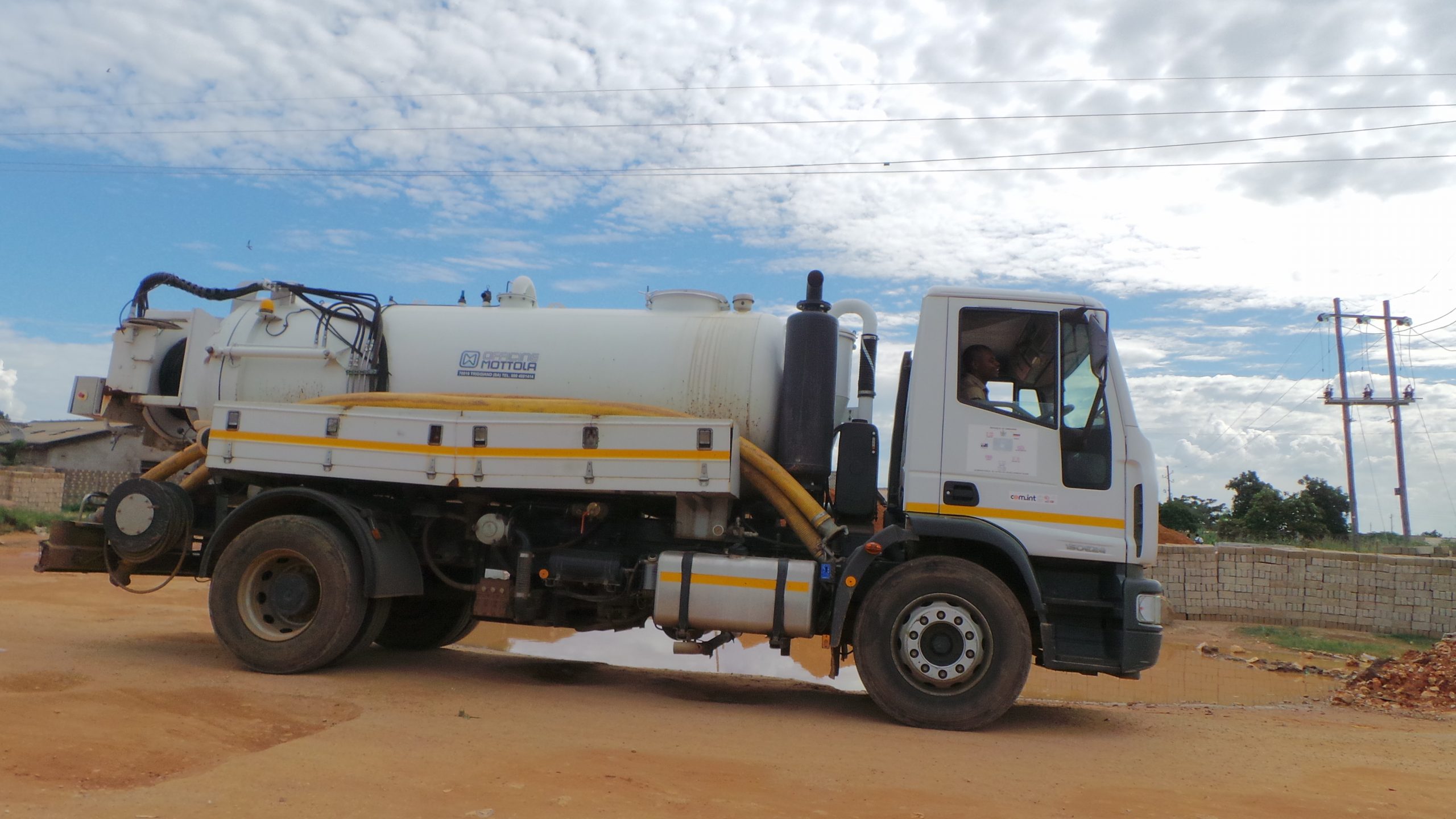
Mrs Lovelin Chapfika’s excitement of purchasing a new house in 2013 quickly turned into disappointment and regret when she discovered that the area experienced severe sewage blockages and overflows. Life has not been rosy for the young mother of three and her family. They once contracted typhoid, which saw them being admitted to the hospital owing to the sewage contamination. Mrs Chapfika is a resident of Chitungwiza Unit C extension situated about 25 kilometres to the south of Harare.
“When the trunk sewer is full, my house is always the first one to be affected because of the back flow. The situation is terrible, more so, during the rainy season as sewage floods the house. I found out that this problem has been in existence, way before we bought the house. I suspect this is why the owner sold it”, she said.
Chitungwiza’s water and sewerage infrastructure was constructed over 50 years ago, having been designed to cater for about a third of its current 500,000 estimated population. The systems are overwhelmed, making it difficult to evacuate the sewage from the town and its residents, resulting in effluent spilling into Harare’s Water Supply catchment area.
After several unsuccessful attempts seeking help from the municipality, which cited funding challenges, Mrs Chapfika sought permission to construct a new sewer line together with other affected residents. While the request was granted, the project was aborted due to design faults on the other end of the residential area where some houses were constructed on top of the trunk sewers.
Chitungwiza’s exposure to waterborne diseases does not only pose a threat to the town’s residents, but to those in the capital city, Harare as well. An estimated 150,000 Chitungwiza residents commute to Harare daily, creating perfect carriers for the disease in and out of the nation’s capital city. Further, given that Manyame River passes through Chitungwiza before emptying into Lake Chivero (Harare’s primary water source), any pollution entering into the river system from Chitungwiza ultimately affects the water quality downstream.

In order to strengthen access to sanitation services in the Municipality of Chitungwiza so as to prevent recurrence of waterborne diseases such as cholera and typhoid, ZimFund has allocated US$1.087 million from its savings towards addressing these sewage woes. Chitungwiza Municipality is already a beneficiary of ZimFund’s Urgent Water Supply and Sanitation Rehabilitation project (UWSSRP) Phase I and Phase II. Under the first phase of UWSSRP, the intervention included rehabilitation of Zengeza’s Conventional Sewage Treatment Works that has a capacity of 35million litres a day, which saw four sets of sewage treatment ponds and five trickling filters being installed.
The US$1.087 million is aimed at addressing the municipality’s perennial outfall and trunk sewer hotspots such as along the Roundabout to Post Office Road, Hombarume, Rufaro and Dumukwa junction, Ruzvidzo and Chiratidzo roads, PaGomba, Zengeza and Seke areas.
- Chamisa under fire over US$120K donation
- Mavhunga puts DeMbare into Chibuku quarterfinals
- Pension funds bet on Cabora Bassa oilfields
- Councils defy govt fire tender directive
Keep Reading
The intervention will concentrate on the following; replacement, upgrading and rerouting of the outfall sewer to run along the new Chitungwiza highway; reroute and upgrade trunk sewers within Seke areas of Luciano and Gomba. The money will also be used to reconnect the collector to the outflow sewers to prevent the frequent sewage spillages as a result of some houses constructed on top of the trunk sewers and small sewers due to new housing connections; supply of three-tone utility vehicles in each of the three districts of Seke, Zengeza and St. Mary’s to deal with blockages timely; provision of technical assistance; improvement of Sewer Inspection Technology including GIS software; operation and maintenance tools; construction of sewer manholes; and provision of Sanitation and Hygiene Education through the Chitungwiza Heath Department.
Project implementation is expected to start in July 2020 with a completion target of December 2020, provided the COVID-19 pandemic does not interfere with delivery and implementation processes. It is anticipated that the intervention will bring back normalcy to residents such as Mrs Chapfika.

“This is the best news I have heard during this Covid-19 pandemic. We look forward to living in a habitable environment with a functional sewerage system. Thanks to ZimFund for supporting us,” said Mrs Chapfika who could not contain her joy.
The ZimFund savings will bring some relief to residents in the town, however, the funds are not enough to fully address the whole of Chitungwiza’s sanitation woes. Chitungwiza Municipality benchmarks its delivery along the standards used by Kigali, Rwanda’s capital city, which is a shining example of an African city that rapidly transformed itself into municipality capable of world class service delivery.
ZimFund is a US$145 million Water & Sanitation and Energy Infrastructure programme, which was established in 2010 after the 2008 Cholera outbreak. The ZimFund programme is generously supported by the governments and people of Australia, Denmark, Germany, Norway, Sweden, Switzerland and United Kingdom. ZimFund is managed by the African Development Bank (AfDB) as part of its operations to improve quality of life in Zimbabwe. In 2010, the Bank through the African Water Facility grant supported the rehabilitation of water distribution, sewage collection systems and capacity development in Chitungwiza by rehabilitating three sewage pumps under the sewage collection system. Following the rehabilitation of the pumps, it became possible to collect sewage from the houses to the sewage treatment works. The African Development Bank also funds water and sanitation projects in other locations such as Bulawayo and Marondera and other sectors in Zimbabwe including; agriculture, transport, social, private, financial and energy sectors.
Disclaimer: Opinions expressed in this article do not necessarily reflect those of ZimFund donors, the African Development Bank, its Board of Directors or the countries they represent. For feedback and more information kindly contact: ZimFund Communications via: [email protected],and [email protected]











